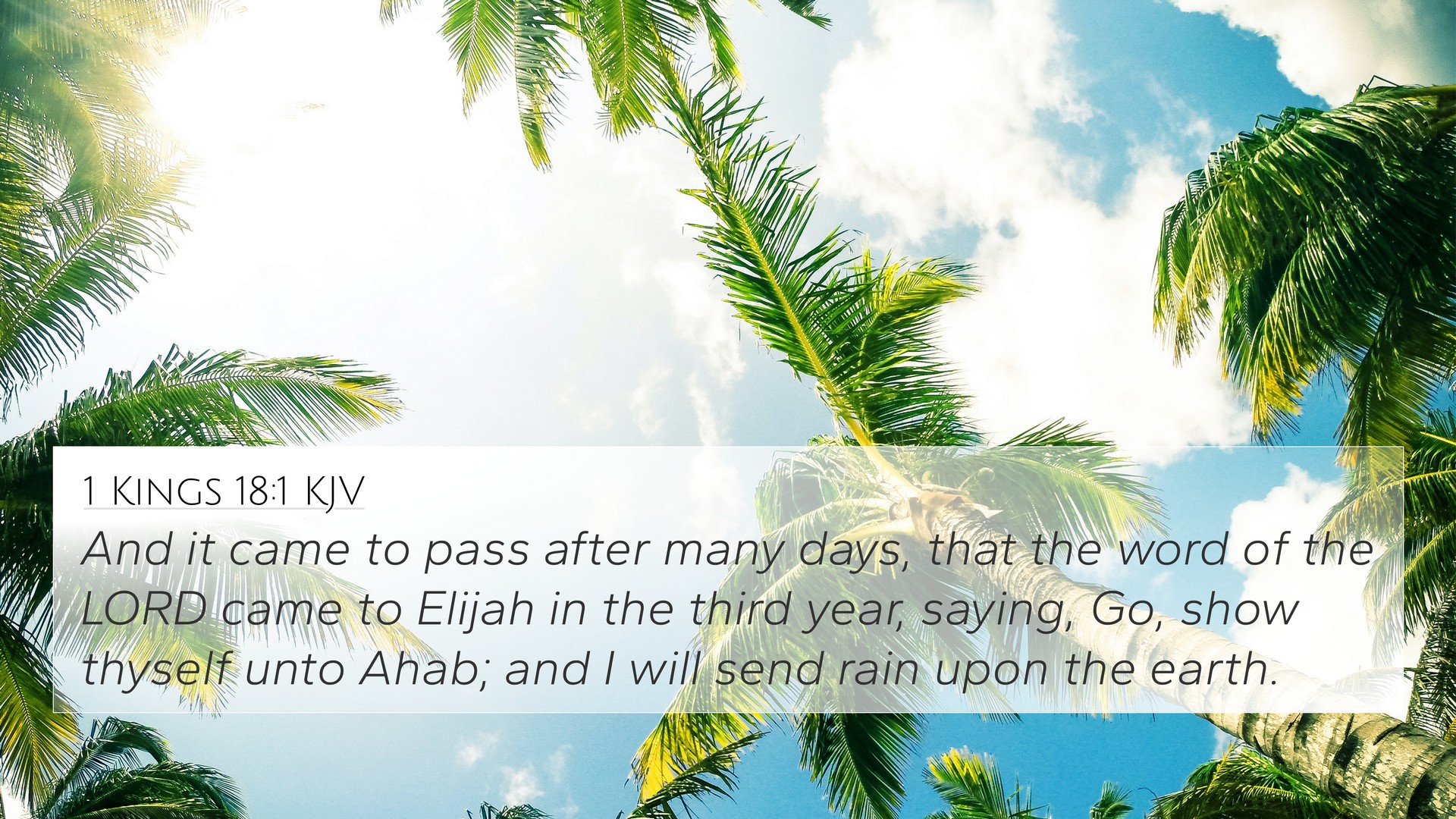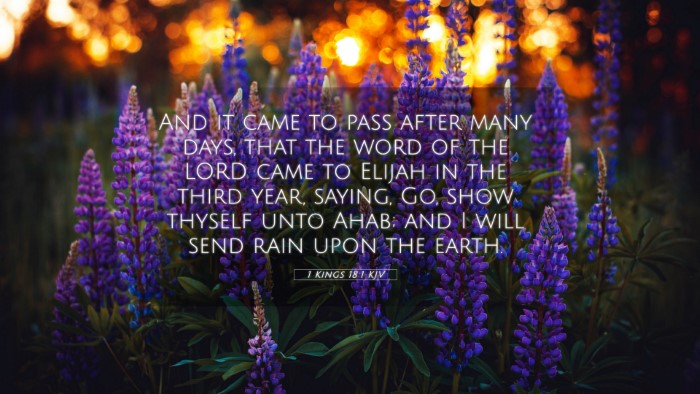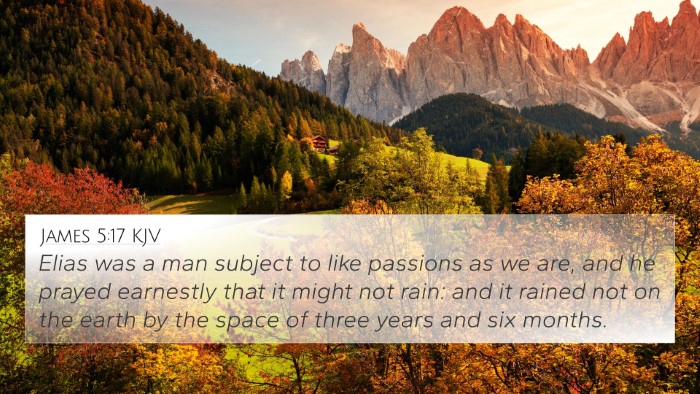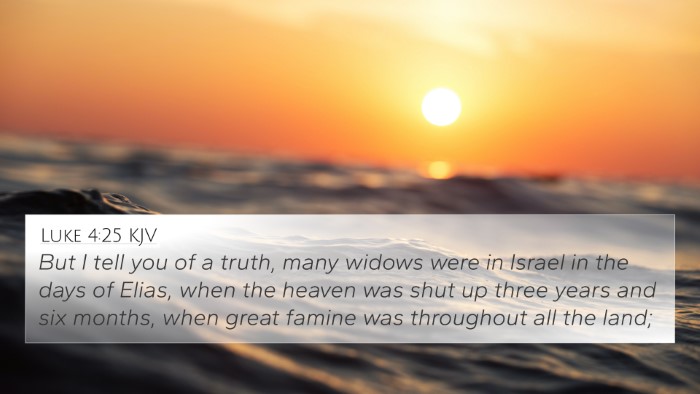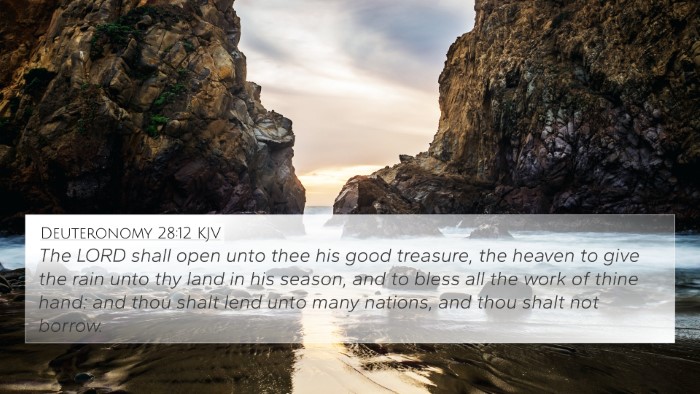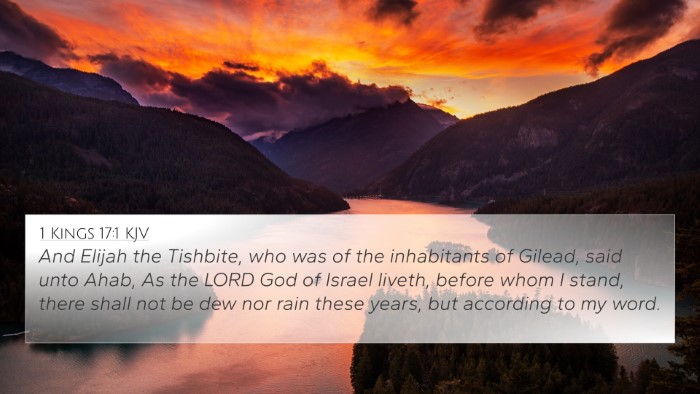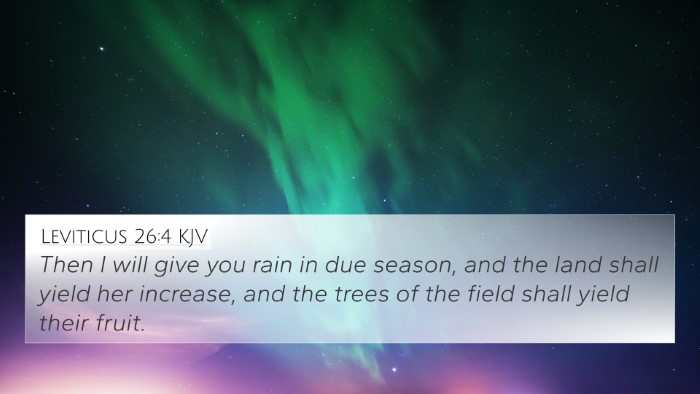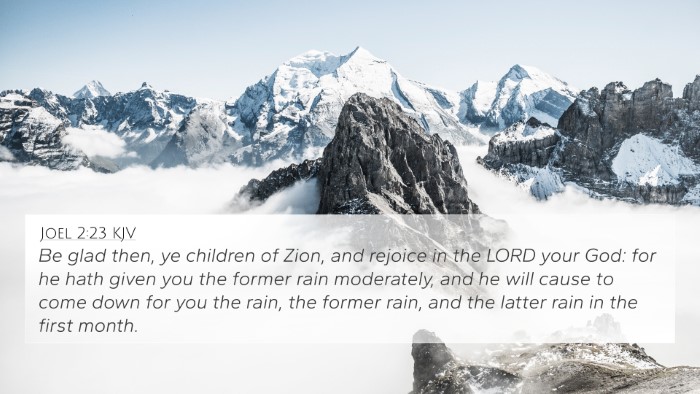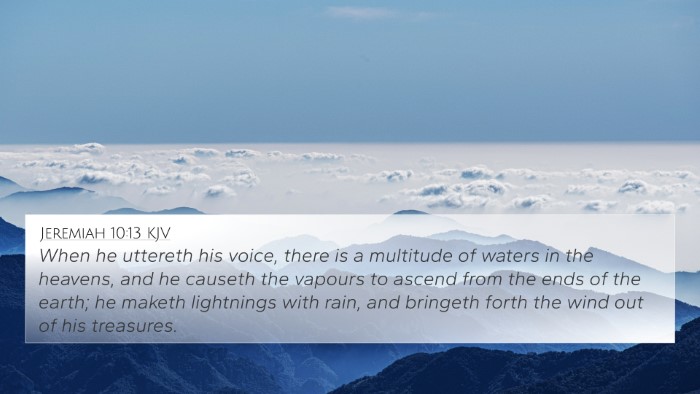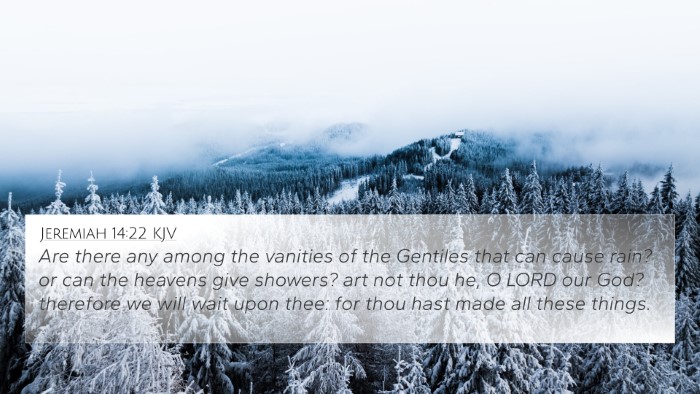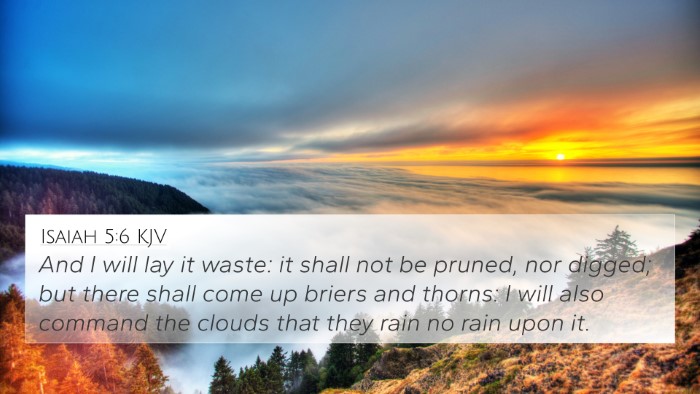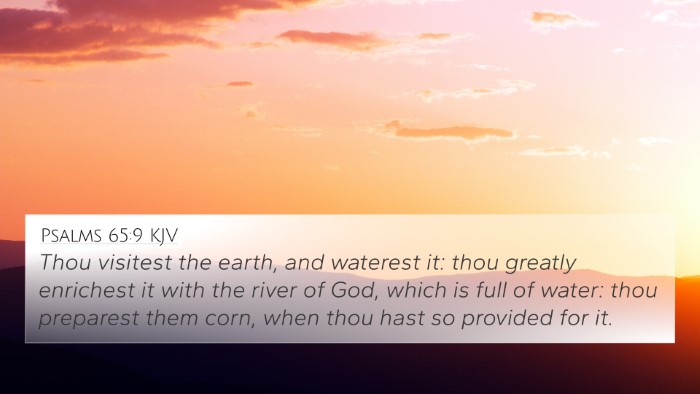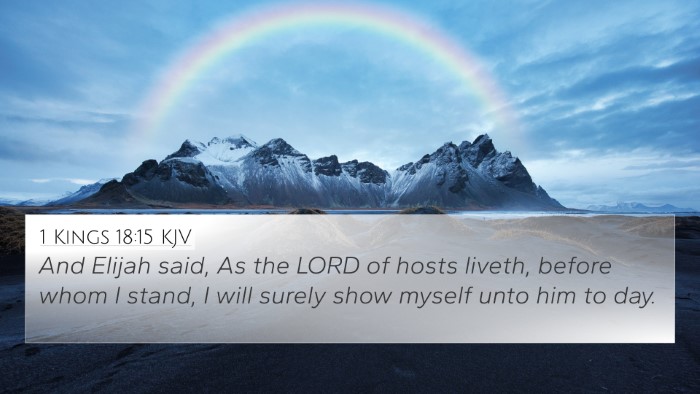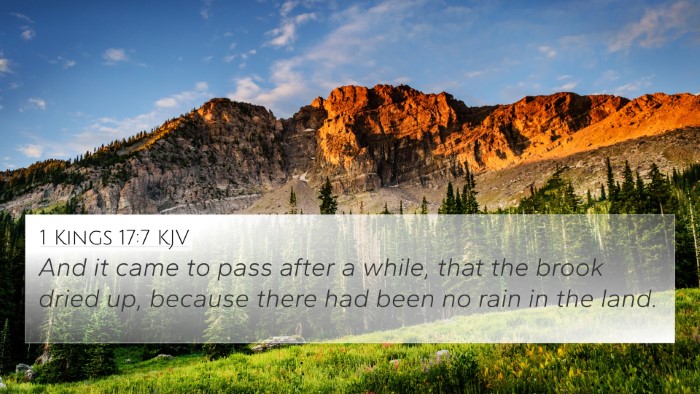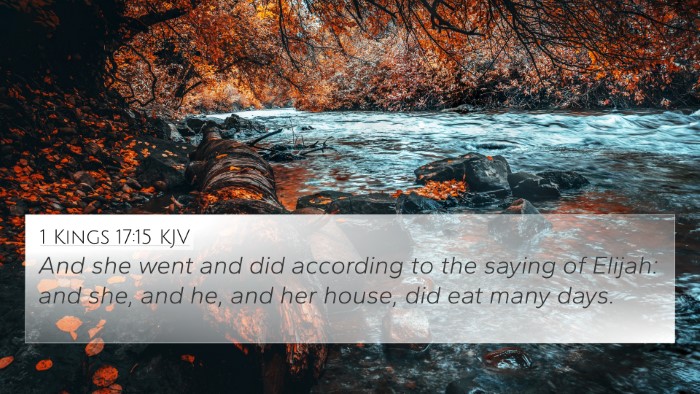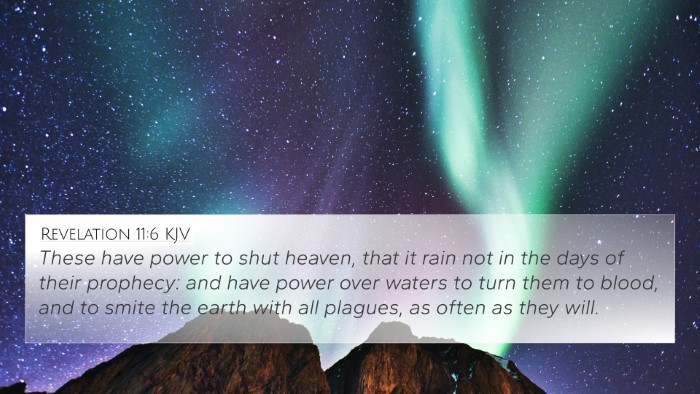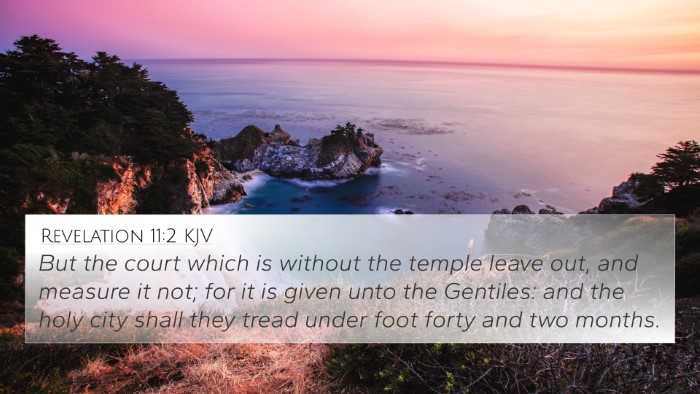Understanding 1 Kings 18:1
Bible Verse: 1 Kings 18:1 (KJV) - "And it came to pass after many days, that the word of the LORD came to Elijah in the third year, saying, Go, show thyself unto Ahab; and I will send rain upon the earth."
Summary of Meaning
This verse marks a pivotal moment in the narrative of Elijah, where God commands him to present himself to King Ahab after a long period of drought. The drought had significant implications for the Israelites, and the announcement of impending rain symbolizes God's mercy and the restoration of His covenant with His people.
Commentary Insights
-
Matthew Henry:
Henry emphasizes the importance of God's communication with Elijah, highlighting that it was not just the physical drought that needed addressing but also the spiritual state of Israel. God’s command signifies a turning point, illustrating His sovereignty over nature and His concern for His covenant people.
-
Albert Barnes:
Barnes points to the significance of the timeline indicated in the verse - the "third year" indicates a prolonged trial for the Israelites. The coming of rain is viewed as a divine response to their suffering and a signal for repentance and return to God.
-
Adam Clarke:
Clarke remarks on the historical context of this event, suggesting that the command to Elijah is part of God’s plan to demonstrate His power over Baal, the false god. The verse serves as a transition towards the confrontation on Mount Carmel, which represents the clash of true worship against idolatry.
Related Bible Verses
This verse connects to several other scriptures that highlight similar themes of God's sovereignty, mercy, and the importance of prophetic voices in Israel.
- James 5:17-18: "Elijah was a man subject to like passions as we are, and he prayed earnestly that it might not rain: and it rained not on the earth by the space of three years and six months." - This shows the context of Elijah's prayer and its direct impact on the weather.
- 1 Kings 17:1: "And Elijah the Tishbite, who was of the inhabitants of Gilead, said unto Ahab, As the LORD God of Israel liveth, before whom I stand, there shall not be dew nor rain these years, but according to my word." - This foreshadows the drought's beginning.
- Deuteronomy 11:16-17: "Take heed to yourselves, that your heart be not deceived, and ye turn aside, and serve other gods, and worship them; And then the LORD's wrath be kindled against you, and he shut up the heaven, that there be no rain..." - This outlines the consequences of idolatry regarding rain and blessing.
- 2 Chronicles 7:13-14: "If I shut up heaven that there be no rain, or if I command the locusts to devour the land, or if I send pestilence among my people; If my people, which are called by my name, shall humble themselves, and pray, and seek my face..." - This encourages repentance and God’s response to prayer.
- Isaiah 58:11: "And the LORD shall guide thee continually, and satisfy thy soul in drought, and make fat thy bones: and thou shalt be like a watered garden, and like a spring of water, whose waters fail not." - This assures of God’s providence even during times of physical drought.
- Hosea 6:1-3: "Come, and let us return unto the LORD: for he hath torn, and he will heal us; he hath smitten, and he will bind us up." - This highlights the call for repentance and the hope of restoration.
- Luke 4:25-26: "But I tell you of a truth, many widows were in Israel in the days of Elias, when the heaven was shut up three years and six months, when great famine was throughout all the land; But unto none of them was Elias sent, save unto Sarepta, a city of Sidon, unto a woman that was a widow." - This connects New Testament recognition of Elijah’s ministry.
Connections between Bible Verses
The thematic connections illuminated in 1 Kings 18:1 allow for a comprehensive study of divine providence, prophetic ministry, and covenant faithfulness throughout both the Old and New Testaments. When analyzing this verse, one can discover various biblical cross-references that illustrate a consistent narrative of God's engagement with His people.
Thematic Bible Verse Connections
To better understand the broader implications of this passage, we can look at how it interacts with other themes in Scripture, such as faithfulness, judgment, and restoration.
-
Faithfulness of God: Throughout Israel's history, God remains steadfast despite the people's unfaithfulness, as reflected in verses like Psalm 124:1-2 and Lamentations 3:22-23.
-
Judgment and Mercy: The cycle of judgment followed by God's mercy can be explored through Jonah 3:4-10 when Nineveh repents and experiences God's mercy.
-
Prophetic Voices: The role of prophets in guiding Israel is prominent, as seen in Amos 3:7 and Micah 6:8.
Tools for Bible Cross-Referencing
Engaging in comparative Bible verse analysis can be facilitated with various tools such as:
- Bible concordances that provide verse location and themes.
- Cross-reference guides that align verses for thematic studies.
- Bible chain references that link sequentially related passages.
How to Use Bible Cross-References
To effectively study the connections between Bible verses, consider the following methods:
- Identify key themes within a verse and seek related scriptures.
- Use a Bible study software to help automate the cross-referencing process.
- Regularly engage in thematic studies to uncover deeper insights.
Inter-Biblical Dialogue
Elijah’s narrative invites readers to explore the correspondences between the Old and New Testaments. The themes of drought and restoration culminate in the life of Jesus, who fulfills the prophetic expectations outlined in the Old Testament.
Conclusion
The significance of 1 Kings 18:1 extends beyond its immediate context, encapsulating long-standing themes of divine judgment, grace, and the portrayal of prophetic authority. The various Bible verses that relate to this passage enhance its meaning and invite further exploration of scripture that addresses similar themes. Through careful study and cross-referencing, one can gain enriched understanding and insight into God's narrative throughout the Bible.
